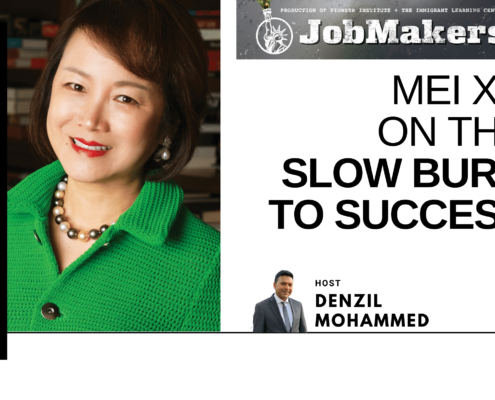Yuliya Tarasava Invests In Americans Who Need It Most
/in Economic Opportunity, Featured, JobMakers /by Editorial StaffThis week on JobMakers, host Denzil Mohammed talks with Yuliya Tarasava, immigrant from Belarus and cofounder and chief operating officer at CNote, a platform that helps facilitate investment in financially underserved communities across America. In just six years, CNote has helped create or maintain more than 4,000 jobs in disadvantaged communities, invested more than 50 percent of capital into small businesses owned by Black, Indigenous and people of color (BIPOC), and invested more than 40 percent of capital into women-led small businesses, eight times the national average. Yuliya believes everybody deserves a chance at success, and dismantling the systemic barriers to such success is what she and her business are all about, as you’ll learn in this week’s JobMakers.
Guest:
 Yuliya Tarasava, COO and Co-founder of CNote, an impact investment platform delivering competitive returns by investing in women, minorities and low-income communities across America. As an experienced financial professional with expertise in risk management and product development, Yuliya focuses on leveraging financial tools to increase economic opportunity for everyone. Previously, Yuliya led the quantitative due diligence for over 20 mutual funds across multiple asset classes for AMG Funds. Later at Summit Rock Advisors, she co-developed the proprietary analytics and risk management framework for a portfolio of over $10B in assets. She was one of 12 individuals selected for Acumen’s Global Fellows program, which led to her running strategy and operations for Juhudi Kilimo, a micro-financial institution in Nairobi that supports farmers and small-to-medium agro-businesses throughout Kenya. Yuliya was born and raised in Belarus and moved to the United States in 2004. She is a CFA and CAIA charterholder.
Yuliya Tarasava, COO and Co-founder of CNote, an impact investment platform delivering competitive returns by investing in women, minorities and low-income communities across America. As an experienced financial professional with expertise in risk management and product development, Yuliya focuses on leveraging financial tools to increase economic opportunity for everyone. Previously, Yuliya led the quantitative due diligence for over 20 mutual funds across multiple asset classes for AMG Funds. Later at Summit Rock Advisors, she co-developed the proprietary analytics and risk management framework for a portfolio of over $10B in assets. She was one of 12 individuals selected for Acumen’s Global Fellows program, which led to her running strategy and operations for Juhudi Kilimo, a micro-financial institution in Nairobi that supports farmers and small-to-medium agro-businesses throughout Kenya. Yuliya was born and raised in Belarus and moved to the United States in 2004. She is a CFA and CAIA charterholder.
Get new episodes of JobMakers in your inbox!
Read a Transcript of This Episode
Please excuse typos.
Denzil Mohammed:
I’m Denzil Mohammed, welcome to JobMakers.
Denzil Mohammed:
Let’s face it. The United States doesn’t always work as well for some, as it does for others looking at the wealth gap and who it affects in this country is, but one very revealing example. And particularly if you come from a place of sameness, like the former Soviet Union, for instance, those gaps in inequities likely stand out even more for Yuliya Tarasava, immigrant from Belarus and co-founder and chief operating officer at CNote, an impact investment platform that delivers returns by investing in women, minorities, and low income communities. America’s inequities stay at her in the face. So she and a friend also with immigrant roots, decided to do something about it. The result is astonishing in just six years. Cnote has helped create or maintain more than 4,000 jobs in disadvantaged communities invested more than 50% of capital into small businesses owned by black indigenous and people of color and invested more than 40% of capital into women-led small businesses. Eight times the national believes everyone deserves a chance at success and dismantling the systemic barriers to such success is what she and her business are all about. As you learn in this week’s JobMakers,
Denzil Mohammed:
Yuliya Tarasava, COO, and co-founder of CNote, thank you for joining us on the JobMakers podcast. How are you?
Yuliya Tarasava:
Good. Thank you for having me, Denzil.
Denzil Mohammed:
So tell us a little bit, you have a very unique company, I would say. And what was the problem that you saw to address with the idea behind CNote?
Yuliya Tarasava:
Yeah. So why CNote exists is to use financial innovation, to solve for wealth gap, to help, to reduce the wealth gap. That was the intention that what, you know, kept myself and my co-founder at night. And that’s what you really wanted to solve by starting CNote.
Denzil Mohammed:
How successful has your company been since 20? You founded it in 2016 in meeting its goals.
Yuliya Tarasava:
You know, I think time really will tell, obviously, as you can imagine, closing wealth gap, it’s a very aspirational goal. Right. And, and I think we can all argue, how do you measure that? I think for us, we are thinking about some of the concrete numbers, you know, like that we can capture, which is the, the capital that we deployed in underserved communities that helped with creating wealth or leveling, you know level in the field. And so far we deployed over I think a hundred, hundred 50 million in capital you know, in other communities around the country. And we have about, you know, like 200 million that is gonna constantly circle in, you know, on the platform. We can also count the number, you know, number of jobs, you know, like that we created, which which is also you know, in, in, in hundreds we can also count, you know, like how many affordable housing units were created by using that capital that you deployed in the communities to build affordable housing, right.
Yuliya Tarasava:
And on the top of it, we, the capital is also used to create community facilities where, you know, kids can gather for post cool education, right. Or, or some activities like we, we, we help to build health clinics. We helped to build healthier food stores, right. In a food desert. So the capital’s really being used to make communities more sustainable, more resilient, and create opportunities for people in those communities to really get to the next, you know, to the next level. And again, leveling the field and giving them opportunities that otherwise they would not have because they don’t have access to capital. They don’t have access to certain financial products and services that, you know, we all used to.
Denzil Mohammed:
And I know that you are headquartered in Oakland, California, even though your team is entirely remote and actually always has been even pre pandemic. And clearly it works very well for you. But you, you chose Oakland intentionally. Can you give us perhaps your favorite example of opportunities that you have created?
Yuliya Tarasava:
Yeah. Oakland? I’m not sure how, how much, how much listen as a formula Oakland was happening there. I really think about Oakland as this like Renaissance story. Right. I think it was forgotten and ignored for a while. It was really considered to be one of their most, you know, crime heavy or riskier neighborhoods, right. In, in kinda like the bay area. And yet with the support of the communities with the right intention, with the right people kind of like really taking ownership of what’s happening there, it’s seeing kind like that, that, that Renaissance that is going through right now with new businesses popping out, right. With new development coming in with again, communities realistic in behind and, and kinda like creating that new future. I mean, we can also talk about all the gentrification that is happening there, which is obviously a part of it, unfortunately, of, of all their new movement that is happening.
Yuliya Tarasava:
You definitely see it, not just in Oakland, but around the country, but I think for us again, it was very intentional to be there because of kind of like all the good stuff that is happening there when it comes to new life, new development, kinda like new, new, new air that was bring into, into Oakland economy. And to your point, even though we’ve been remote, even before pandemic, we’re gonna continue to be remote. The intention is still there to, to be in Oakland and to continue supporting this economy to continue supporting this community. First and foremost,
Denzil Mohammed:
I just looked up to see if there was a whole foods in Oakland and yes, there is. <Laugh>, it is, it is talk about gentrification. Okay. So take us along the journey with you and your co-founder. What was it like to bring this company to where it is today and what were some of the lessons you learned in starting this company?
Yuliya Tarasava:
Actually listened to some of your, some of your podcasts you know, in preparation for this one. And I heard someone talking about answering similar question in a way that always have always have a co-founder, you know, running the company in your own, just like so hard. I will totally sign up to that. It’s really, it’s really, really hard to, to start and to grow the company on, on your own. I really think about the company is it’s a child and it definitely takes a village. And it takes, you know, parents to begin with and then their whole village to support. And so, you know, the relationship that myself and, and my co-founder has, you know, Catherine Berman, we’ve been friends before we became business partners and we were very much aligned first of first, first of all, as people like what, what we want to see in the world, like, how do you really see ourselves?
Yuliya Tarasava:
Like, what’s really important for us. We’ve gone through like a, a, a long journey together, really aligning ourself personally, and then moving on it. Okay. Like now how, how we see the world and what do we want, what, what do we want the world to be? And so having that alignment just like incredibly important, because things will go sideways. You know, it’s obviously entrepreneurship journey, it’s always ups and downs and it’s gonna be frustrating. It’s gonna be annoying. It’s gonna be devastating. It’s gonna be all, all, all the, all the things that sometimes you just wanna stop and, and, and resign, or, or, or you a little bit there. And then what really keeps you going is that alignment and that, you know, keeping, keeping your eyes on that north star, right. And as long as, as long as kinda like you have those eyes and a north star, and your aligned with your partner, with your business partner, that would really keeps you committed and keeps you on this journey.
Yuliya Tarasava:
And then beyond that, obviously, you know, it’s not just me and CAD who’s, who’s running the company is the whole team. And now we are, you know, we are about 25 people, and this is the whole village that takes to, to raise the child right. To, to bring C to, to, to the level where it is right now. And bringing people on board again, understanding they’re not just here because of their job security or because of the money, but they’re really here because they share your vision, they share your mission. They, they, they share the passion, right, for economic justice, for social justice. They really share that desire and, and, and the intention that the world needs to look different. That’s what really bring people on board. And that’s what really keeps people around in spite of the fact that again, startup journey can be volatile.
Yuliya Tarasava:
Right. And, and we don’t, we kinda like building, you know, we often give this analogy, like we build in the plan as we go, right? Like we, we, we have the direction, right. We like, we know the destination, but there’s a lot of things that happen along the way. And you have to be flexible. We have to be agile, you know, like we have to be really good communicators. So there’s a lot, there’s a lot of things that have to go, right. In order to get us there and, and again, having the right team and having like Ray committed team and passionate team, and also like that clear communication matters a lot in that journey.
Denzil Mohammed:
You once said that gender equality and women’s empowerment are the DNA of C your company. Can you explain this a little bit?
Yuliya Tarasava:
Yeah, of course. So we are female led and female own C and we, we very much recognize that women founders have been neglected, you know, very much recognize that the culture, as we know it, and the companies have often been defined by maybe overall over minimally male energy, right. And the companies rather than, than female. And, and for us right now, if you look at who we are, and, and again, who is a part of that village we have a lot of women, you know, we, we are very, very proud to say that, you know, engineering team is, is the biggest, is the biggest team at sea. And I think 80% of the team is is female. And, and we continue effort on and keep growing the team and keep giving young, promising, you know, female professional opportunity to really raise up and, and, and be successful and get exposure to, to that, to the corporate role, to that impact investing world that we, that we operate in. So, yeah, so we are, you know, we care who we bring on board, you know, we care how the company run, you know, like I think the fact that we are female led and female own creates like a certain, a certain culture that also attracts, you know, more women.
Denzil Mohammed:
So I’ve spoken to several entrepreneurs who are in this finance space Christina Chi from Domage, for instance and other minorities who talk about, you know, they went to a conference and someone asked them to get them a Coke because they didn’t look like they were the traditional finance people. So it’s really amazing that you’re doing this kind of work in this space. But let’s take it back to your background. You mentioned background you come from a place where <laugh>, the president has called himself the last dictator of in Europe, he’s your one and only president. What was life like back in Belarus? Growing up,
Yuliya Tarasava:
Growing up in a Soviet union was probably more instrumental and, and to kinda like my development and to my development as a, as a, as a person, but also creating that really interesting contrast, right. Between like how many using the socialism and capitalism. Right. And really kind of like seeing process and minuses behind, you know, behind both systems. So, you know, for me growing up, growing up in Soviet union, and I’m, I’m very much, you know, used to, like, everyone is the same. Everyone is getting exactly the same. Everyone looks the same, everyone wears the same. Everyone kinda like have access to you know, same opportunities and stuff. And, and some of the things, you know, kinda like provided to you. And, and I can tell you, you know, like when, so union broke up, a lot of people were not really happy because not only, you know, you are older and, and you kinda like have to readjust right.
Yuliya Tarasava:
To, to a new way of living. And, and probably, you know, like my, my parents and my grandparents, they were definitely not like a big supporter of like going into this new system and because they were just like, so, you know, their mind was just like, so baked, you know, so baked in like in the old way, old way and old world. And then honestly, the, the transition was, was, was obviously not the best you know, for kind of an average, you know, an average person, right. Like I remember we member, we, you know, very quickly we went from like having everything to like suddenly having nothing and, and, and using our food stamps to get, you know, to get any type of food that we could not grow for ourselves, you know, using the, the, the, the piece of land that we had or, or, you know, grow animals.
Yuliya Tarasava:
Right. so it was, it was, it was a really interesting experience, remembering that again, going from abundance to now some sort of, you know, poverty and again, standing online in stores and, and literally facing like empty, empty shelves. And so that’s, I think, like really really formed my, I don’t dunno if it’s understanding, but kinda like formed my maybe like multi kinda like structural, multi vertical view on the world. And, and like, again, understanding that you know, capitalism and, you know, free markets, it’s, it’s working to a certain extent. Right. But there’s also like some of that social aspect that is actually really interesting to bring into that system. And I think that’s what that’s, that’s the whole, you know, that’s what we are trying to do right now is this whole concept of like social enterprise, right. When people saying, Hey, just, just focus in on your maximizing, your return and maximizing your revenue, maximizing shareholder value is not necessarily the right thing. You kind like have to start thinking about their, the welfare and the, the, the, the impact in the whole world. And I think some of that, I, I could definitely see some of that connection, you know, back back to my childhood and just like how excited I was actually explore this, like, new models of, of, of creating the value
Denzil Mohammed:
Clearly that had an impact on how you saw economics. Yeah. And when you came to the us, which of course is the, the shining example of free markets and capitalism, how did that make you feel about economics in the us and this idea of free markets?
Yuliya Tarasava:
Yeah, yeah. When growing up, when growing up in, in be, and again, specialized beroe was going through a transition and, and we became more open to the Western world and started hearing more stories on how people live in, in Europe or in America. Very often there, the perception that we had is America is the richest country. And almost to the point that, you know, money leaves, money grows in the, you know, on the trees, which obviously you know, meat, but to some extent, that’s how America was portrayed through, you know, shows and, and media, et cetera. And so I remember, you know, when I was born to United States, there’s definitely kinda like that excitement to experience that it’s like, oh my God, like, I’m going to that, you know, land of, you know, honey rivers and again, money, money going in the tree, right.
Yuliya Tarasava:
It was definitely kinda like this idealized view of, of America. And then coming to United States very quickly, that view was was shattered in, in, in pieces. And it is because, you know, I came to United States. I, I decided that I want to, to continue my education. And I really wanted to study finance given given that it was my interest that I, I, I identified state economics back home in <inaudible> and then being here in the United States, going to school, realizing that I cannot get access to, to loan. And, and, and I have to have a support from some of their communities that are already created, so they can vouch for me and still, you know, being able to pay in cash and working like long hours and leaving, you know, in kinda like in the cheapest place I can possibly find, I found myself in Bridgeport.
Yuliya Tarasava:
And then in Bridgeport it’s a very divided, it’s a big Connecticut general, it’s a very divided state. Like you have you know, this concept of red lining, right? Like you have across the line’s primarily PAC community. And then across the street wide is gonna be primarily white community. And at that time it didn’t really make sense for me. I didn’t really know the concept of red lining, but then as I, as I started going through som as I studied, like learning more about it, it just suddenly was, was realizations like, wow, America, the way we see it from outside is actually not the America that you experience when you come, when you come here and the, the color of your skin very much defines the future that you, that you have here. You know, again, what zip code you were born into, again, defines, defines that your opportunity to actually generate wealth and then understanding how a lot of the issues that we are dealing in America right now is really structural issues, right? It was just result of the way the laws were written, you know, the way the history unfolded and, and kind of like us in a procrastinating as a society, doing something about it. Now we are dealing with, you know, the largest wealth gap in the history and, and you know, all this, all this, you know, health issues, educational issues, I mean, you name it right. And it’s really goes back to that, to, to, to, to those systematic changes that we’ve been, you know, not, not real, not, not, not willing to tackle.
Denzil Mohammed:
So you moved here when you 20 years old in 2004. And I really appreciate that the nuanced understanding you have about how things work in the United States, that’s really terrific, and that you’re working very steadfastly to address that. So how do you feel overall, personally about the United States as that place that allowed you to actualize, you know, this particular bell, Russian United American dream?
Yuliya Tarasava:
Yeah, no, again, I, I don’t, I don’t want to sound like downer in the United States. I think United States does give a lot of opportunities to people. And I think if you are, if you’re smart, if you’re driven, if you’re dedicated I think there’s a lot of doors that, and, you know, resilient. Right. I think that’s, that’s a big part of it as well. Like I think a lot of doors can really be open to, to, to, to you. And and again, I’m obviously experienced it myself, you know, like I work hard, I started hard. Like I, you know, I put myself out there and, and I I was knocking the doors, you know, like until the door open and at some point the doors, the, the doors open. So I absolutely don’t want to diminish again, the opportunities that America has, has given to me.
Yuliya Tarasava:
And, and honestly, I’m also interestingly enough, surrounded mostly by people that are immigrants here. Just, I think, you know, we just have so much to resonate with. Right. And we have so much to, in common that I think it’s, it’s very, it’s very normal that I’m gonna be surrounded by people like, like me, who’ve gone through like similar journeys. So yeah. And, and most of them have like wonderful lives and have families and, you know, to build like the build the beautiful life here. So yeah, absolutely. America is a wonderful place for people to really try their energy, to try their ideas, to try their you know I know projects that they have in mind
Denzil Mohammed:
As a fellow immigrant, who is, who does not have his family here. I can tell you. And I, I, that I know how hard it is just to exist much less thrive, just beam by yourself. You don’t have that social capital to, to count on you. Don’t have mom and dad, you know, to crash if you lose your place. Exactly. So I really appreciate the success that you’ve had so far, and I look forward to so much more success coming from you. I really appreciate the work that you do, and thank you for creating the jobs that you’ve, that you’ve created.
Yuliya Tarasava:
Thank you. Thank you. Absolutely. Thank you for reaching out was like fantastic to connect and thank you for letting me tell the story.
Denzil Mohammed:
Yuliya Tarasava immigrant from Belarus and co-founder and chief operating officer at CNote. Thank for joining us on the Jobmakers podcast. This was great. Jobmakers is a weekly podcast about immigrant entrepreneurship and contribution produced by Pioneer Institute, a think tank in Boston and at the immigrant learning center in Malden, Massachusetts, a not-for-profit that gives immigrants a voice. Thank you for joining us for today’s powerful story of immigrant entrepreneurship. Remember, you can subscribe to job makers on apple podcast, Spotify, or wherever you get your podcasts. And please leave us a rating and a review I’m Denzil Mohammed. See you next Thursday at noon for another Jobmakers.
Recent Episodes:
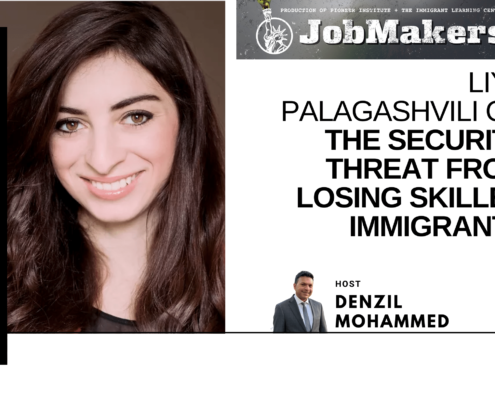
Liya Palagashvili on the Security Threat from Losing Skilled Immigrants
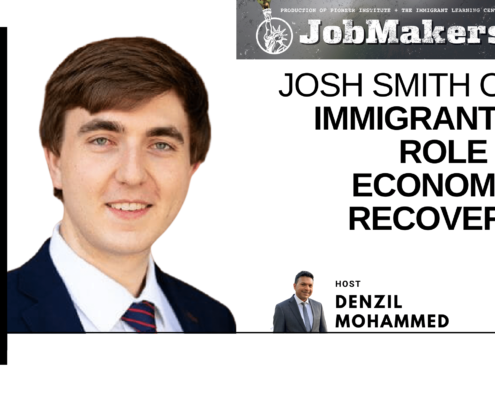
Josh Smith on Immigrants’ Role in Economic Recovery
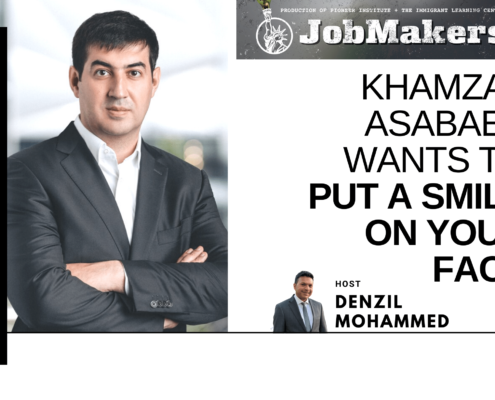
Khamzat Asabaev Wants to Put a Smile on Your Face
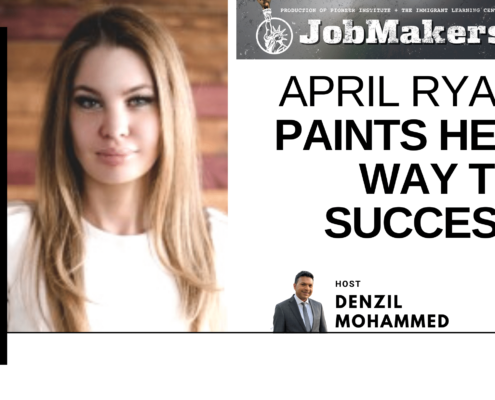
April Ryan Paints Her Way to Success
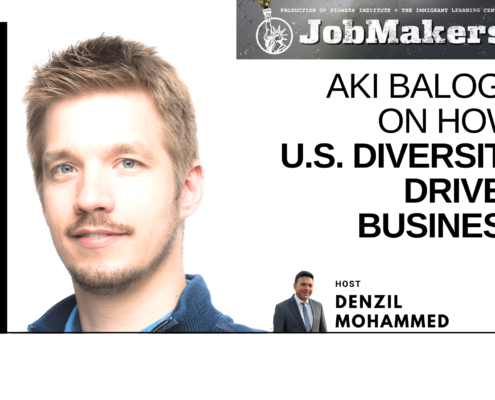
Aki Balogh on How U.S. Diversity Drives Business
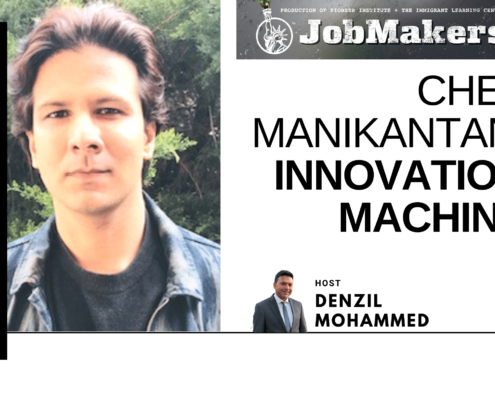
Chet Manikantan: Innovation Machine
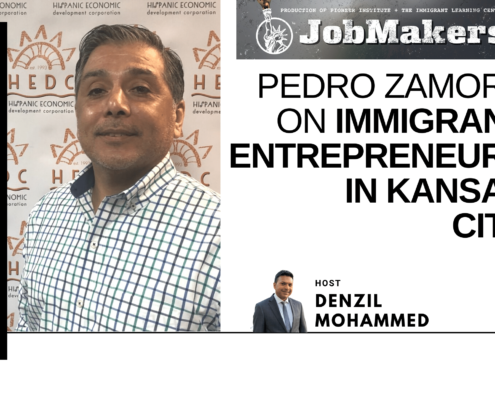
Pedro Zamora on Immigrant Entrepreneurs in Kansas City
